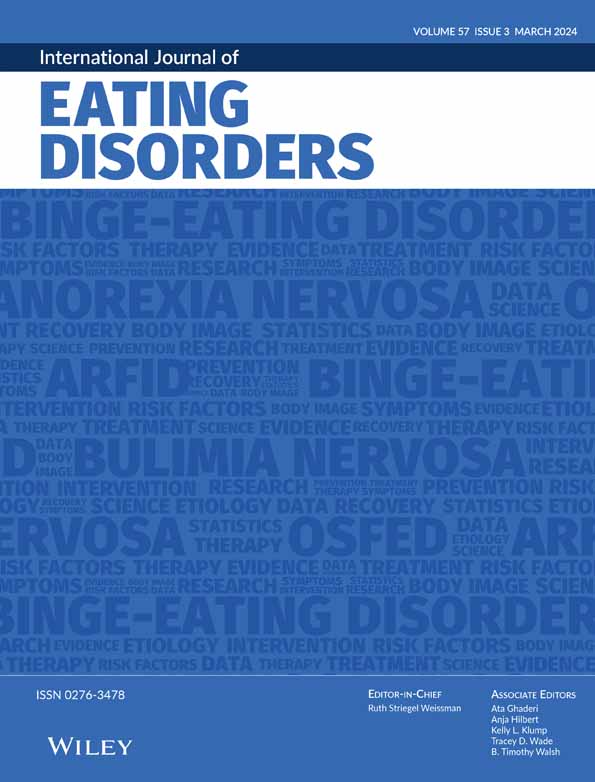Momentary skills use predicts decreased binge eating and purging early in day treatment: An ecological momentary assessment study
This study was conducted in partial fulfillment of Danielle E. MacDonald's postdoctoral research fellowship at the University of Toronto and the University Health Network (2016–2017, fellowship funded by the Loretta Anne Rogers Chair in Eating Disorders at the University Health Network and University of Toronto [held by M. P. Olmsted]). Portions of these results have been presented at: the 2021 Eating Disorder Research Society Annual Meeting; the 2022 International Conference on Eating Disorders; and the 2022 Department of Psychiatry Research Day, University of Toronto. Marion Olmsted was affiliated with the University Health Network (UHN) Eating Disorder Program at the time of the study, and is now retired, but continues to be affiliated with the UHN Toronto General Hospital Research Institute and the University of Toronto.
Abstract
Objective
Emerging research indicates that skills acquisition may be important to behavior change in cognitive behavior therapy (CBT) for eating disorders. This study investigated whether skills use assessed in real time during the initial 4 weeks of CBT-based day treatment was associated with momentary eating disorder behavior change and rapid response to treatment.
Methods
Participants with DSM-5 bulimia nervosa or purging disorder (N = 58) completed ecological momentary assessments (EMA) several times daily for the first 28 days of treatment. EMA assessed skills use, the occurrence of binge eating and/or purging, and state negative affect. Rapid response was defined as abstinence from binge eating and/or purging in the first 4 weeks of treatment.
Results
Greater real-time skills use overall, and use of “planning ahead,” “distraction,” “social support,” and “mechanical eating” skills in particular, were associated with a lower likelihood of engaging in binge eating or purging during the same period. After controlling for baseline group differences in overall difficulties with emotion regulation, rapid and non-rapid responders did not differ in overall skills use, or skills use at times of higher negative affect, during the EMA period.
Discussion
Momentary use of skills appears to play an important role in preventing binge eating and purging, and certain skills appear to be particularly helpful. These findings contribute to the literature elucidating the processes by which CBT treatments for eating disorders work by providing empirical evidence that skills use helps to prevent binge eating and purging behaviors.
Public Significance
Individuals with eating disorders learn new skills during treatment to help them improve their symptoms. This study shows that for people with eating disorders, using skills helps prevent eating disorder behaviors in the moment. Certain skills may be particularly helpful, including planning ahead, distracting activities, support from others, and focusing on eating meals and snacks regardless of how one is feeling. These findings help us better understand how treatments work.
CONFLICT OF INTEREST STATEMENT
Danielle E. MacDonald, Kathryn Trottier, Li Cao, and Scott G. Engel have no conflicts of interest to disclose. Ross D. Crosby, Stephen A. Wonderlich, and Marion P. Olmsted sit on the editorial board of International Journal of Eating Disorders; Ross D. Crosby is a paid Statistical Consultant for Health Outcomes Solutions, Winter Park, Florida, USA; Marion P. Olmsted receives royalties from New Harbinger Publications.
Open Research
DATA AVAILABILITY STATEMENT
Data for this study cannot be made publicly available due to institutional ethical restrictions around patient confidentiality.




